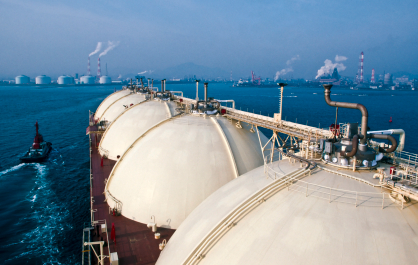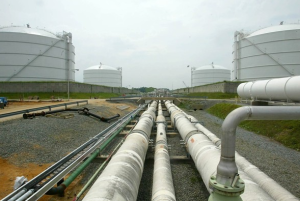Energy Department approves expanded LNG exports
 Courtesy of The Washington Post by Steven Mufson: The Energy Department gave a terminal near Freeport, Tex., permission Friday to ship liquefied natural gas to Japan, providing a new outlet for rising U.S. production of shale gas despite qualms of environmentalists and many domestic manufacturers.
Courtesy of The Washington Post by Steven Mufson: The Energy Department gave a terminal near Freeport, Tex., permission Friday to ship liquefied natural gas to Japan, providing a new outlet for rising U.S. production of shale gas despite qualms of environmentalists and many domestic manufacturers.
The permit marks another step in the sudden reversal of fortune in the natural gas business. Less than five years ago, anticipating a worsening shortfall in domestic supplies of natural gas, the Freeport terminal on Quintana Island began operations as an import facility.
But advances in hydraulic fracturing techniques have unlocked new supplies of natural gas from shale rock. Freeport, like other import terminals, now wants to spend $10 billion to retool the terminal so it can send gas abroad in liquefied form.
 Japan, with virtually all of its nuclear power plants shut down, is paying extremely high prices for energy imports and is looking for new supplies. Osaka Gas and Chubu Electric agreed to buy all of the liquefied natural gas, or LNG, from the first of three phases of the Freeport export project for 20 years. The facility was conditionally authorized to export at a rate of up to 1.4 billion cubic feet of natural gas a day.
Japan, with virtually all of its nuclear power plants shut down, is paying extremely high prices for energy imports and is looking for new supplies. Osaka Gas and Chubu Electric agreed to buy all of the liquefied natural gas, or LNG, from the first of three phases of the Freeport export project for 20 years. The facility was conditionally authorized to export at a rate of up to 1.4 billion cubic feet of natural gas a day.
It was the second permit given by the Energy Department for LNG exports to a country that does not have a free trade agreement with the United States. The department said it weighed economic, energy security and environmental considerations as well as nearly 200,000 public comments.
The issue of whether to export natural gas has been controversial. Producers of natural gas and supporters of free trade have urged the Obama administration to approve LNG export facilities. But environmentalists fear that it will provide incentives for a new wave of drilling in places such as Pennsylvania.
Moreover, domestic manufacturers, especially those from the petrochemical industry which uses natural gas as a raw material as well as an energy source, oppose substantial exports of natural gas. They say the surge in gas supplies and the modest prices for natural gas give the United States a competitive advantage that will revive industry and create more value than would be gained from exports.
Dow Chemical, one of the leading voices opposing widespread exports, also owns a share of the Freeport terminal through a subsidiary. On Friday, it issued a statement calling the Freeport permit “a prudent step in pursuit of a measured and balanced approach” to LNG exports while adding that it “will adopt a wait and see approach regarding further approvals.”
In an interview, Peter A. Molinaro, Dow Chemical’s vice president of federal and state government affairs, said that the company was worried that a combination of retirements of old coal-fired power plants and new industrial plants (including one of its own) between 2016 and 2020 could push natural gas prices sharply higher.
“We are the voice of the consumer, and we plan to continue to be,” Molinaro said.
 Natural gas prices recently hit a 20-month high after an unusually cold March. The benchmark Henry Hub spot price averaged $4.17 a thousand cubic feet in April, the highest monthly average price since July 2011, according to the Energy Information Administration.
Natural gas prices recently hit a 20-month high after an unusually cold March. The benchmark Henry Hub spot price averaged $4.17 a thousand cubic feet in April, the highest monthly average price since July 2011, according to the Energy Information Administration.
The EIA forecasts that natural gas production would increase from 69.2 billion cubic feet a day in 2012 to 70.1 billion cubic feet a day in 2014. According to a new Barclays report, if all of the other 14 terminals seeking Energy Department export permits were approved, their total capacity would amount to 28.7 billion cubic feet a day.
Senate Energy and Natural Resources Committee Chairman Ron Wyden (D-Ore.) said that the Energy Department “will be making export decisions on a case-by-case basis” in a way that is “consistent with my belief that a measured approach on exports will provide the greatest advantage for the U.S economy.” Wyden said the department should “assess the market impacts of each export decision after it is announced, to ensure American consumers are not harmed by large-scale exports.”
“This decision is a victory for those who believe free trade is good for the American economy,” said the committee’s ranking Republican member, Sen. Lisa Murkowski (Alaska).
The Freeport terminal is half owned by ConocoPhillips and half by a group of four limited partners headed by chief executive Michael Smith.
The department granted the first authorization to export 2.2 billion cubic feet a day of LNG to non-free-trade countries in May 2011 for the Sabine Pass LNG Terminal in Cameron Parish, La. The Freeport facility already had received permission to ship LNG to countries with free trade agreements.
Category: Featured, Fuel & Oil, General Update, Green










